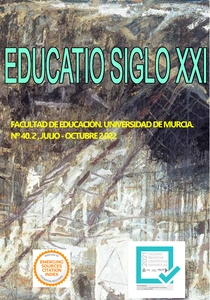George Orwell and Twitter: Teaching English literature through social networking sites.
Abstract
The information and knowledge society in which we live currently has proven how pedagogy needs a profound connection with technology and virtuality. However, it is not the same to apply technology to pedagogy than transforming pedagogy through technology. The objective of this article is to propose a feminist affective pedagogy for teaching English as a Foreign Language in Higher Education. In order to do this, contemporary literature is defined as a transmedial tool. Using digital ethnography, I produce an auto-ethnographic reflection about students’ participation in a transmedial practice, more specifically the creation of a collective Twitter profile that translates contemporary novels into reflections about our society. Three lines of research are established. These are the establishment of contemporary literature as a social network, the implementation of affective critical pedagogy through literature and the class itself as a continuum between virtuality and space. It concludes with three main affirmations: 1. Teaching literature from collective reading enables transmedial practices. 2. Literature is a technological tool that generates critical affective capacity. 3. The class must be materialized as a safe space so that students share responsibilities with instructors for their own learning process.
Downloads
-
Abstract1150
-
PDF (Español (España))647
References
Berardi, F. (2020). Crónica de la psicodeflación. En P.Amadeo (ed.), Sopa de Wuhan (pp. 35–54). ASPO.
Camps, V. (2011). El gobierno de las emociones. Barcelona: Herder
Castells, M. et al. (Ed.). (1994). Nuevas perspectivas en educación. Barcelona: Paidós.
Coleman, R. (2018) Theorizing the present: digital media, pre-emergence and infra-structures of feeling, Cultural Studies, Vol. 32 nº4, pp. 600-622.
Colman, F. (2020). Feminising politics: notes in material and temporal feminist modal logics in action. Matter: Journal of New Materialist Research. Vol. 1 nº1, pp. 1 - 22.
Colman, F. (2014). Feminicidad digital: predicación y medida, informática materialista e imágenes. Artnodes. Vol. 14, pp. 7-17. http://dx.doi.org/10.7238/a.v0i14.2408
Colman, F. & Stapleton, E. (2017). Screening feminisms: approaches for teaching sex and gender in film. In B. Revelles-Benavente & A. González (eds). Teaching Gender: Feminist Pedagogy and Responsibility in Times of Political Crisis (pp. 99 - 116). New York & London: Routledge
Danvers, E. (2016). Criticality’s affective entanglements: rethinking emotion and critical thinking in higher education. Gender and Education. Vol. 28 nº 2, pp. 282 - 97. https://doi.org/10.1080/09540253.2015.1115469
de Riba, S. (2020). (Seguir) teorizando los afectos y las emociones en la investigación educativa desde enfoques feministas. Feminismo/s. Nº 35, pp. 321 - 348.
Falzon, M. (ed.) (2009) Multi-sited ethnography: theory, praxis and locality in contemporary research. Ashgate publishing: Surrey
Flecha, R. (1994). Las nuevas desigualdades educativas. En Castells, et. al. (ed.) Nuevas perspectivas en educación. (pp. 55 - 82). Paidós: Barcelona. En Castells, et. al. (ed.) Nuevas perspectivas en educación. (pp. 55 - 82). Barcelona: Paidós.
Freire, P. (1994). Educación y participación comunitaria. En Castells, et. al. (eds.) Nuevas perspectivas en educación. (pp. 83 - 96). Paidós: Barcelona
Haraway, D. (1988). Situated Knowledges: The Science Question in Feminism and the Privilege of Partial Perspective. Feminist Studies, Vol. 14 nº 3, pp. 575 – 599.
Autora (2019).
Hickey-Moody, A., et al. (2016). Diffractive pedagogies: dancing across new materialist imaginaries. Gender and Education, Vol. 28 nº2, pp. 213-229
Juelskjær, M. (2020). Mattering pedagogies in precarious times of (un)learning. Matter: Journal of New Materialist Research Vol. 1 nº1, pp. 52 - 79. https://doi.org/10.1344/jnmr.v1i1.30067
Miño, R. et al. (2019). Comunidades virtuales: dinámicas emergentes de participación social y aprendizaje entre los jóvenes. Education in the knowledge society. 20. https://doi.org/10.14201/eks2019_20_a21
Nxumalo, F. (2017). Storying practices of witnessing: Refiguring quality in everyday pedagogical encounters. Contemporary Issues in Early Childhood. Vol. 17 nº1, pp. 39 - 53. https://doi.org/10.1177/1463949115627898
Pink, S. (2013). Doing Visual Ethnography. Sage Publishing: Los Angeles & New York.
Autora (2017)
Autora (2015).
Rivera-Vargas, P. y Passeron, E. (2020). El confinamiento ciudadano: un ‘excepcional’ entorno para dialogar, compartir y aprender sobre educación. El diario de la Educación. Se puede acceder en: https://eldiariodelaeducacion.com/2020/05/18/el-confinamiento-ciudadano-un-excepcional-entorno-para-dialogar-compartir-y-aprender-sobre-educacion/
Sancho, J. (2019). De la tecnología para aplicar a la tecnología para pensar: implicaciones para la docencia y la investigación. Revista Latinoamericana de Tecnología Educativa, Vol. 18 nº1, pp. 9-22.
St. Pierre, E.A. (2014). A Brief and Personal History of Post Qualitative Research Toward “Post Inquiry”. Journal of Curriculum Theorizing. Vol. 30 nº2. Se puede acceder en : http:// journal.jctonline.org/index.php/jct/article/viewFile/521/stpierre.pdf
van der Tuin, I. (2008). Deflationary Logic. Response to Sara Ahmed’s ‘Imaginary Prohibitions: Some preliminary Remarks on the Founding Gestures of the ‘New Materialism’. European Journal of Women’s Studies, Vol. 15 nº 4, pp. 411-416.
Vizcaíno-Verdú, A. et al. (2019). Lectura y aprendizaje informal en YouTube: El booktuber. Comunicar. Vol. 59 nº XXVII, pp. 95 - 104
Copyright (c) 2022 Servicio de Publicaciones de la Universidad de Murcia

This work is licensed under a Creative Commons Attribution-NonCommercial-NoDerivatives 4.0 International License.
Original work publishes in this journal is subject to the following terms:
1. Murcia University Press (the publishing house) holds the copyright of the publishes work, and favours and allows their reutilization under the use license stated in point 2.
© Servicio de Publicaciones, Universidad de Murcia, 2015
2. Work is published in the electronic edition under a license (Creative Commons Reconocimiento-NoComercial-SinObraDerivada 4.0 España (legal text). They can be copied, used, disseminated, transmitted and publicly presented, as long as: i) authorship and original publication source is acknowledged (journal, publishing house and URL of the work); ii) are not used for commercial purposes; iii) the existence and specifications of this use license is stated.
3. Conditions for self-archive. Authors are allowed and encouraged to disseminate electronically the pre-pint (before review) and/or post-print (accepted for publication) versions of their work before their publication since that favours earlier circulation and dissemination resulting in an increased chance for the authors to be cited and for the work to reach a bigger share of the academic community. Colour: RoMEO: green.








